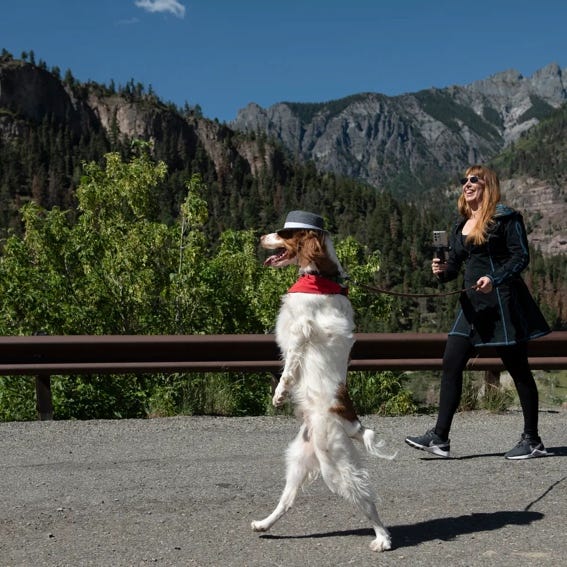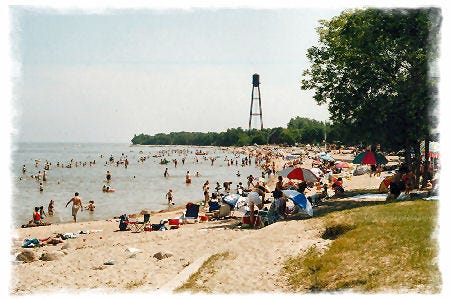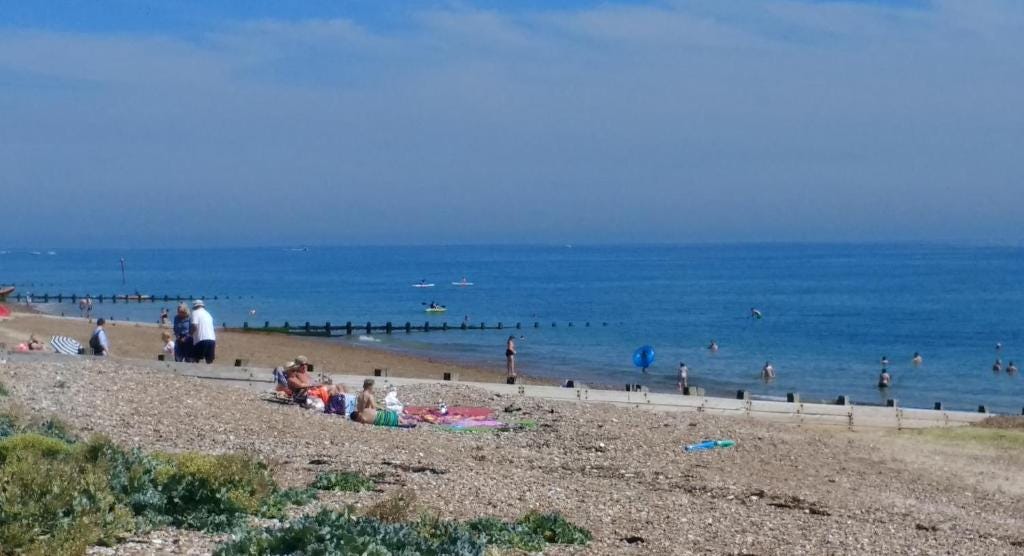Toronto, September 21, 2025
A woman preaching
The other day my friend Randy Hahn told me that he’d asked Chat GPT to write something in the style of this newsletter. (Randy is semi-retired, and has time on his hands.) We all know about Chat GPT. It has about 800 million active users, and its usage and capabilities are growing rapidly. Randy sent me a copy of what Chat GPT produced.
The bot began by shamelessly displaying its seductive sycophantic tendencies. It wrote: “Philip Slayton’s ‘The Endgame’ columns are known for their elegant fatalism, urbane melancholy, and wry detachment, often blending personal reflection with commentary on aging, politics, or the slow unraveling of institutions. The tone is reflective, sometimes elegiac, but never self-pitying...” I thought: So far, so good.
Then came Chat GPT’s own attempt at a column. Here’s an excerpt.
“By now, I know better than to be surprised by much. I’ve seen governments fall and rise again under different names, watched friendships decay not from betrayal but neglect, learned that almost every promise—political or personal—is a matter of convenience. Age grants you this clarity, though it does not ask if you want it.
“I am old now. There is no clever way to say it. My joints announce themselves in the morning, my memory plays little games with me in the afternoon, and by evening I’ve usually forgotten what irritated me at lunch—a small mercy. The body retreats before the mind, or the mind before the body. If you’re unlucky, they go together, hand in hand, a cruel love story with no moral.
“And yet—and yet—there is a peculiar lightness in this late season of life. A stripping away of obligation. I no longer need to impress, convince, or seduce. There are few things left I need to win, and fewer still I need to fear. Death, after all, has become a neighbour—quiet, present, not especially aggressive, but never quite out of earshot. It sharpens the view...”
So, has artificial intelligence put me out of a job? First of all, writing the Endgame is not much of a job. My brother-in-law Sheldon once said to me, in a rather pointed fashion, “A job is something that you get paid for doing.” But some scribblers, I am told, actually receive money for their work. Is it over for them? Will they be replaced by AI?
I don’t think ink-stained wretches have much to worry about, not yet. Chat GPT is moderately fluent, but I found its attempt at an Endgame column dull and clumsy. E.g.: “I know better than to be surprised by much.” “The body retreats before the mind, or the mind before the body.” “[T]here is a peculiar lightness in this late season of life.”
I can do better than that (I hope my readers agree). But for how long? Vast investments are being made in artificial general intelligence and many predict that soon AGI models will be better than the average human at most cognitive tasks. Will Chat GPT, and the other AGI bots, soon remove my reason to get up in the morning?
No machine will ever write a play like Shakespeare’s King Lear or music like J.S. Bach’s Toccata and Fugue in D Minor. To do that, you have to be touched by God. Geniuses have nothing to fear from AGI. The rest of us? We’ll see. Meanwhile, Chat GPT’s attempt to write reminds me of what Dr. Johnson said about women preaching. “It’s like a dog’s walking on his hind legs. It is not done well; but you are surprised to find it done at all.”
*****
Some reader comments on Endgame #117 (“The beach”)
Michael Mendelson writes: As I sit in my hospital bed at the Toronto General Hospital, waiting for my third surgery this year, what could be a better way to pass the time than contemplating the beach and writing comments on Philip’s substack? When I was little (i.e., about 6 to 10) I’d spend summers with my cousins (one and two years younger than me) at my Baba’s 1920’s summer lodge in Winnipeg Beach. The lodge was a big square wooden construction, with 16 ‘suites’ created by thin plywood walls dividing the building into separate compartments like slices of a square pie, each with its own door and its own oak ice box. Everyone shared the four smelly outhouses in the backyard. Everyone collected their water at one of three nearby pumps.
To supplement the outhouses, the backyard also had two separate small cottages, reputedly inhabited by ‘ladies of the night’ charging hourly rates in the lodge’s heyday. During the 30s and especially the war years, the lodge had been crammed full of raucous guests for all of July and August, but by the time we spent our summers there only two or three suites would be booked. Sadly, the two small cottages sat derelict and empty. Every morning my cousins and I would head to the seemingly endless sandy beach on Lake Winnipeg, pulling a wagon with beach supplies (towels, little shovels and plastic buckets, etc.), where we would spend each endless day entertaining ourselves. I cannot recall any adult supervision, although an aunt or someone would appear with sandwiches at lunch time. As the day wound down we’d often walk the long, long beach collecting empty pop bottles, which we would then trade-in for two cents a bottle and use the cash to buy ice cream and candy. The lodge is now long gone, but I’m still here, more or less, with memories of sun-drenched beach summers, where I spent every day thinking about neither the past nor the future.”
Heather Cram tells us more about Winnipeg Beach: “Philip, I thoroughly enjoyed your essay about the beach/beaches. You sparked my nostalgia for the beach of my childhood, Winnipeg Beach on Lake Winnipeg in Manitoba. The cottage we stayed in was the very one described by Michael [see comment above]. My memory of that time and the wagon full of beach accessories is that my cousin Gwenny and I, who were older, took the then little boys to the beach in the morning and we all played, swam freely with no adults, except for the odd other mothers who would scold if we overstepped our freedom. Our mothers came down at lunchtime and, after eating our sandwiches and cookies, we had to wait a full half hour before we could go back into the water. Those were the longest half hours in my life. The carefreeness of that time is especially nostalgic given the world as it is today. Over the last five or so years, I’ve been designing the exhibits for a small regional museum in St-Georges, MB, which sits on the edge of the Winnipeg River, which empties into Traverse Bay on Lake Winnipeg. We’ve designed one exhibit that focuses on the trains that came up from Winnipeg to Grand Beach on one shore and Winnipeg Beach on a shore further west. We would pull that same wagon to the train station to meet the Saturday morning trains. All of the fathers would arrive for their weekends with their families. Those were the days!!”
Peter Mushkat writes from Nova Scotia: “The picture of you and your grandson is very like a French Impressionist painting...As for ‘Rustington’, see verse two of ‘The Gnu Song’ by Flanders and Swan (another from the Department of There’s a Song for Everything!). ‘I had taken furnished lodgings down at Rustington-on-Sea/ Whence I travelled on to Ashton-under-Lyne it was actually/ And the second night I stayed there I was wakened from a dream/ Which I’ll tell you all about some other time...’”
From the esteemed food writer Naomi Duguid: “I love the layers in this, the comforting sense of continuity. Those of us who have memories of their childhood and the chance to be the adult in a subsequent generation's childhood are so fortunate...”
Bob Rae: “Wistful and wonderful.”
And finally, a generous comment from Anne Mowat about All Remaining Passengers, my new book: “There is so much coming at us in the firehose of streaming content that it's hard to keep up. But every so often, a writer touches me in a way that sticks, that resonates with my perspective. I very much enjoyed Philip Slayton's book, which offers an old school way to appreciate what is an anthology of his earlier Substack posts. Scanning through dozens of links Substackian publishers these days, I realize that I am actually looking for Philip's meditative perspective on growing older in Canada in these fraught times. Thank you.”
All Remaining Passengers is available from Amazon in most countries, and from some independent bookstores in Canada (coast-to-coast) including Ben McNally Books and Book City (Yonge & St. Clair branch) in Toronto, Munro’s Books in Victoria, B.C., Russell Books in Victoria, and Salt-Water Ballad Books in Port Medway, Nova Scotia.








The quote from Johnson rather bad taste.
Well, mercifully, Philip, Chat GPT hasn’t furloughed you because you’re my favourite Substack Scribe by the proverbial country mile but, frankly, I was kinda impressed by the Fake Philip epistle. Quite cunning IMHO!